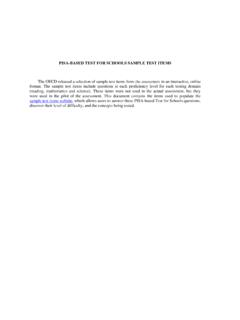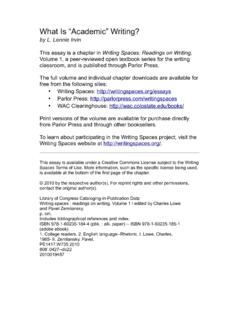Transcription of Effective Teaching of Inference Skills for Reading - ed
1 Effective Teaching ofInference Skills forReadingLiterature ReviewResearch Report DCSF-RR031 Anne KispalNational Foundation for Educational Research Effective Teaching of Inference Skills forReadingLiterature ReviewAnneKispalNational Foundation for Educational ResearchThe views expressed in this report are the authors and do not necessarily reflect those of theDepartment for Children, Schools and Families. National Foundation for Educational Research 2008 ISBN 978 1 84775 141 6 Research Report NoDCSF-RR031 ProjectTeamAnne KispalResearchersLiz TwistPauline BenefieldLibraryLynne HarrisAlison JonesNi kki KeoghProject Administration Assistant1 ContentsExecutive theredifferent Skills in Inference ?.. Different types of inferences: What are inferences used for? .. Different types of inferences: How many inferences are there?
2 What are the Skills involved in Inference ? .. Conclusion .. Summary .. can pupils best be taught to use Inference An inferencetraining successstory .. What to Summary .. strategiesaremost effectiveinteachinginferenceanddeduction Skills to pupils at different ages and Materials .. Strategies for children of all Age-specific strategies: what progression in Inference lookslikeand howit can be supported .. Summary .. 48 Appendix 1: Search Strategy ..582 Executive summaryIntroductionIn 2007, the Department for Children, Schools and Families (DCSF) commissionedthe National Foundation for Educational Research (NFER) to conduct a review ofresearchevidenceon inferenceskills for Reading , including the Skills that constituteinferencing and how to ability to makeinferences is, in simple terms, the ability to usetwo or morepieces of information froma text in order to arrive at a third pieceof information thatis implicit.
3 Inferencecan be as simple as associating the pronoun he with apreviously mentioned male person. Or, it can be as complex as understanding asubtle implicit message, conveyed through the choiceof particular vocabulary by thewriter and drawing on the reader s own background knowledge. Inferencing Skills areimportant for Reading comprehension, and alsomore widely in the area of literarycriticismand other approaches to studying texts. The National Curriculum lays muchemphasis on the Skills of Inference , especially at Key Stages 2 and key finding of the review was that the ability to draw inferences predeterminesreading Skills : that is, poor inferencing causes poor comprehension and not there different Skills within Inference ?Different researchers have identified many different kinds of Inference ; however,there is no general consensus in the literature about the number of types ofinference, or how they should be most frequently cited inferencetypes have been defined and exemplified should be noted that there is some overlap between inferences (also known as text-connecting or intersentenceinferences).
4 Thesemaintain textual integrity. For example, in the sentencePeterbegged his mother to let himgo to the party, the reader would have to realisethat thepronouns his and him refer to Peter to fully understand the inferences (also known as gap-filling inferences). Theseenrichthemental representation of the text, :Katy dropped the vase. She ran for thedustpan and brushto sweep up the reader would have to draw upon lifeexperienceand general knowledge to realisethat the vasebroke to supply theconnection between these inferences. These create a coherent representation at the local level ofsentences and paragraphs. This classof inferences includes:1. coherenceinferences (described above).2. casestructure role assignments , stood his bikeagainst the needs to realisethat the tree is assigned to a location some antecedent causal inferences, rushed off, leaving his reader would need to infer that Dan was in a hurry and left hisbicycle vulnerable to inferences.
5 Thesecreate a coherent representation covering the whole reader needs to infer overarching ideas about the theme, main point or moral ofa text by drawing on local pieces of inferences:inferences drawn automatically during inferences:inferences drawn strategically after can pupils best be taught to useinferenceskills?The researchevidencereviewed suggested that, in order to be good at inferencing,pupils need to: be an active reader who wants to make senseof the text monitor comprehension and repair misunderstandings have a richvocabulary have a competent working memoryInferencing Skills are also facilitated by: having a wide background knowledge sharing the same cultural background as that assumed by the textSome of thesefactors are more pertinent to certain types of inferencethan example, having a wide background knowledge does not influencethe ability todraw coherenceinferences to the same degree as it does elaborative or the characteristicsof good inferencers have been identified, there is limitedresearchevidenceto suggest how teachers could best improve the inferencingabilities of their pupils.
6 Available researchevidencepoints to the importanceof:Teacher modelling of inferencing: teachers "thinking aloud" their thoughts as they read aloud to pupils teachers asking themselves questions that show how they monitor their owncomprehension teachers making explicit the thinking processes that result in drawing level work: developing fluent basic Reading Skills ( practice in decoding print) vocabulary building: aurally and in Reading lexical training, in local cohesive devices (suchas pronouns andconnectives).Text level work: making explicit the structure of stories discussing the role and usefulnessof a title emphasising that fiction allows multiple interpretations and by the teacher: asking How do you know? whenever an inferenceis generated in discussionof a text asking questions about relationships between characters, goals andmotivations asking questions that foster comprehension monitoring, suchasIs thereinformation that doesn t agree with what I already know?
7 Ensuring that pupils are not interrupted in their Reading by asking questionsduring Reading time, or launching into questioning too soon by pupils: training pupils to ask themselvesWhy-questions while Reading Teaching the meaning of the question words who , when , why etc. asking pupils to generate their own questions froma text using of prior knowledge: asking pupils to generate associations around a topic, and discussand clarifytheir collective and contextualisation: working on predictive and contextualising Skills for example via cloze andsimilar work: listening to stories and story tapes listening comprehension activities practising inferential questions on aurally presented the right texts: taking care not to choose texts that are too easyfor classwork: very explicittexts provide few opportunities for inferences to be curricular work: discussion of texts in curricular areas outside strategies are most effectivein Teaching inferenceskills to pupils of differentages/abilities?
8 What does progression in Inference look likeand how can it besupported?No evidencewhichdirectly answers thesequestions was the subject of pupils' age, it was apparent that inferencecan be seen in childrenof all ages and can even be practised with pre-readers using picture books. Thissuggests that inferencing can be practised outside the domain of Reading with pupilsof all ages and that one way of cultivating theseskills in young readers and reluctantreaders is to do it in discussion, , at the same time the researchindicates that pupils are most receptive toexplicit Teaching of inferenceskills in their early secondary of the reviewThis review was carried out between August and December 2007. The aimwas touncover what was known about the Teaching of inferenceby looking through the mostrobust work conducted in the UK over the last 20 years and from the USA over thelast decade.
9 The searchwas guided by four researchquestions: Are there different Skills within Inference ? How can pupils best be taught to useinferenceskills? What strategies are most Effective in Teaching inferenceskills to pupils ofdifferent ages/abilities? What does progression in inferencelook like and how can it be supported?Overall, few studies explicitly investigating best methods for Teaching Skills wereidentified. The conclusions of this review should therefore be considered as indicativerather than work was carried out under contract to the Department for Children, Schoolsand Families (DCSF) in responseto a request to review literature on inferenceanddeduction. FromKey Stage 2 onwards, inferenceis at the centre of the readingcurriculum. Skills of inferenceare needed not just to be able to read between thelines, to detect the unspoken hidden meanings that enrichoverall understanding of atext or to draw one s own personal conclusions about a text.
10 They are needed for allthe other tasksthat teachers want their children to do in handling texts: to understandthe effects achieved through choices in vocabulary, to recognisewhat the writer istrying to accomplishthrough the whole text and to appreciate what the impact on thereader may be. Almost any Reading activity that goes beyond literal understandinginvolves some degree of researchquestions guiding the review were: Are there different Skills within inferenceand deduction? How can pupils best be taught to useinferenceand deduction Skills ? What strategies are most Effective in Teaching inferenceand deductionskills to pupils of different ages / abilities? What does progression in inferenceand deduction look like and how canit be supported?The evidence baseThe searchwas targeted at Britishresearchdating from 1988 and internationalliterature published in the Englishlanguage from 1999.













